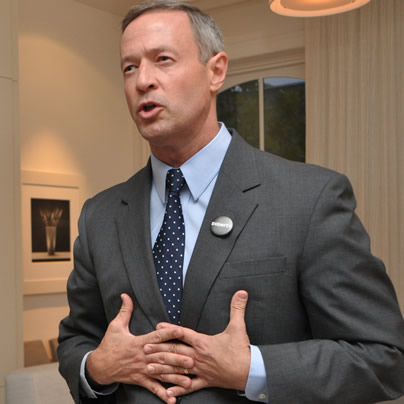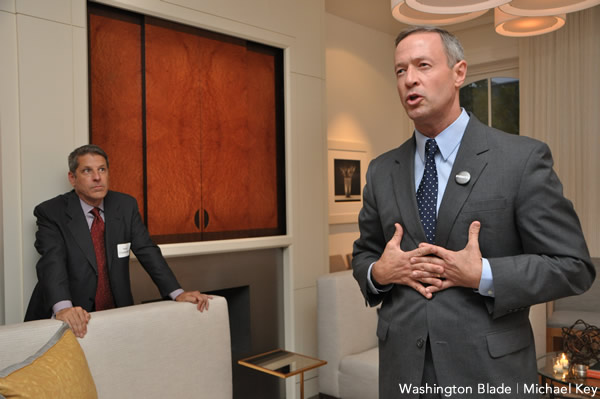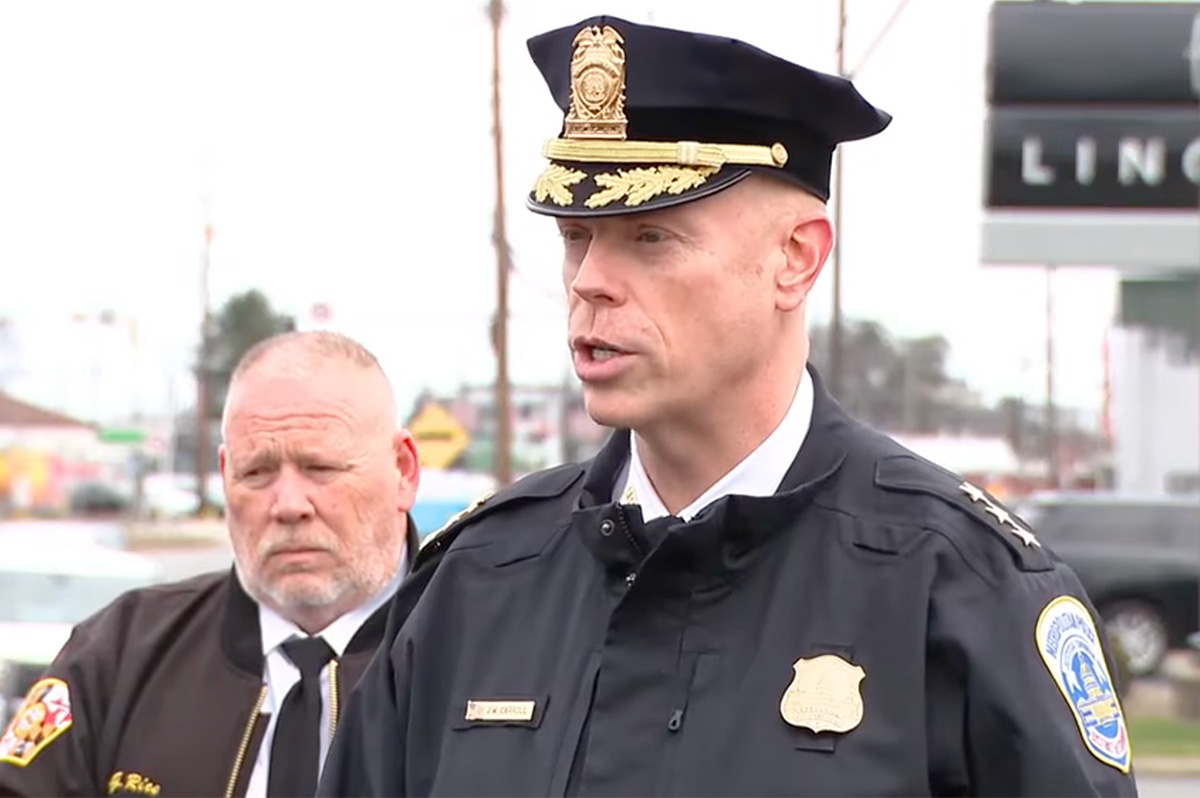Local
Marriage ads to hit Md. airwaves
Pro-Question 6 campaign has purchased more than $500,000 in air time


Maryland Gov. Martin O’Malley at a Tuesday fundraiser in D.C. (Washington Blade photo by Michael Key)
Public records indicate that the campaign to defend Maryland’s same-sex marriage law has purchased hundreds of thousands of dollars of airtime on local television stations ahead of next month’s referendum.
Documents posted on the Federal Communications Commission’s website indicate that Marylanders for Marriage Equality has purchased $297,325 of air time on WBAL in Baltimore for 291 30-second advertisements that are scheduled to run from Oct. 10 through Nov. 6. FCC records further note that the campaign has also purchased $253,000.01 worth of air time on WJLA in D.C. from Oct. 29 through Nov. 6. Marylanders for Marriage Equality has also purchased airtime on WUSA in the nation’s capital, but documents filed with the FCC do not indicate a specific cost.
FCC records further indicate that the campaign has also made inquiries into potential media buys with WJZ in Baltimore and WRC in D.C.
Documents further note that Media Strategies and Research of Fairfax, Va., produced the ads. Josh Levin, campaign director of Marylanders for Marriage Equality, declined to answer questions about their specific content. He stressed, however, that they are part of what he described as the campaign’s ongoing outreach to Maryland voters on Question 6.
“We’ve seen the polls tightening in the public numbers over the last week,” said Levin. “That’s why it’s so important for us to get out on the air and get the message out there. We need to get the message to as many people as possible. That’s what we’ve been asking our supporters to do.”
Levin told supporters in a Sept. 20 e-mail that said the campaign needed to raise $500,000 over the “next two weeks” to counter Question 6 opponents’ ads. He said in the same fundraising pitch that Marylanders for Marriage Equality had only been able to purchase a week’s worth of television air time “in some places so far.” FCC records indicate that the Maryland Marriage Alliance has purchased $93,475 of air time on WBAL for 110 30-second ads that are slated to run from Oct. 8 through Nov. 5. The group has also purchased air time on WMAR in Baltimore.
FCC documents note that Frank Schubert of Mission: Public Affairs, LLC, in Sacramento, Calif., on July 12 requested air time on both WJLA and WUSA. Schubert, who is the national political director for the National Organization for Marriage, masterminded the campaign behind California’s voter-approved Proposition 8 that banned nuptials for same-sex couples in 2008. He also led efforts to overturn Maine’s 2009 law that would have allowed gays and lesbians to tie the knot and to pass a constitutional amendment earlier this year in North Carolina that defined marriage as between a man and a woman.
Levin implied that his organization’s Sept. 20 appeal was successful.
“I think you could draw that conclusion,” he told the Blade.
Marriage campaign needs to raise an additional $1 million
Gov. Martin O’Malley said during an Oct. 2 fundraiser for Marylanders for Marriage Equality at the D.C. home of gay Democratic lobbyist Steve Elmendorf that the campaign still needs to raise an additional $1 million before Election Day. He told a group of LGBT bloggers and reporters during a Sept. 24 conference call that Marylanders for Marriage Equality needed an additional $2 million ahead of the Nov. 6 election.
“This is by no means done,” said O’Malley. “And in your presence here tonight, I hope that when you leave here, you leave here committed to help us turn on the after-burners for the next 36 days.”
Meanwhile, Baltimore Ravens center Mark Birk earlier this week spoke out against marriage rights for same-sex couples in an op-ed in the Minneapolis Star-Tribune newspaper in his native Minnesota. He also appeared in a Minnesota Catholic Conference web ad in support of a proposed constitutional amendment that would define marriage as between a man and a woman in the state.
“I can put up a lot from the government like higher taxes and while I don’t like it, pushing God out of schools. But letting a small number of business and government elites and judges define what marriage is for Minnesotans doesn’t seem very fair. It doesn’t make a lot of sense,” said Birk, who compared a lawsuit that seeks to overturn the state’s same-sex marriage ban to the Iowa Supreme Court decision that led to nuptials for gays and lesbians in the Hawkeye State. “Politicians have said they will try to redefine marriage at their earliest opportunity, even next year if the marriage amendment doesn’t pass. Our culture today of moral irrelevantism attacks marriage and a lot of our Catholic values, but marriage is the foundation of our society and is definitely something worth fighting for — my marriage and the institution itself. A lot of people say live and let live; let everybody do what they want. But this is too important of an issue to do that on. We need to stand up and fight for it and preserve it for our sake, for our children’s sake and for the sake of our entire society. The state should have laws to protect marriage because it was around long before the state came around. I don’t think it’s their place to redefine it.”
Ravens linebacker Brendan Ayanbadejo continues to speak out in support of marriage rights for same-sex couples in Maryland.
“We should be doing everything we can to make Maryland families stronger, which is why I support marriage for gay and lesbian couples who want to make a lifetime commitment together,” he says in a Marylanders for Marriage Equality web ad. “People from all walks of life, including gay and lesbian couples, want their children to be in stable homes and protected under the law.”
Ayanbadejo is scheduled to attend a Marylanders for Marriage Equality fundraiser with O’Malley in Baltimore on Oct. 8.
District of Columbia
Kennedy Center renaming triggers backlash
Artists who cancel shows threatened; calls for funding boycott grow

Efforts to rename the Kennedy Center to add President Trump’s name to the D.C. arts institution continue to spark backlash.
A new petition from Qommittee , a national network of drag artists and allies led by survivors of hate crimes, calls on Kennedy Center donors to suspend funding to the center until “artistic independence is restored, and to redirect support to banned or censored artists.”
“While Trump won’t back down, the donors who contribute nearly $100 million annually to the Kennedy Center can afford to take a stand,” the petition reads. “Money talks. When donors fund censorship, they don’t just harm one institution – they tell marginalized communities their stories don’t deserve to be told.”
The petition can be found here.
Meanwhile, a decision by several prominent musicians and jazz performers to cancel their shows at the recently renamed Trump-Kennedy Center in D.C. planned for Christmas Eve and New Year’s Eve has drawn the ire of the Center’s president, Richard Grenell.
Grenell, a gay supporter of President Donald Trump who served as U.S. ambassador to Germany during Trump’s first term as president, was named Kennedy Center president last year by its board of directors that had been appointed by Trump.
Last month the board voted to change the official name of the center from the John F. Kennedy Memorial Center For The Performing Arts to the Donald J. Trump And The John F. Kennedy Memorial Center For The Performing Arts. The revised name has been installed on the outside wall of the center’s building but is not official because any name change would require congressional action.
According to a report by the New York Times, Grenell informed jazz musician Chuck Redd, who cancelled a 2025 Christmas Eve concert that he has hosted at the Kennedy Center for nearly 20 years in response to the name change, that Grenell planned to arrange for the center to file a lawsuit against him for the cancellation.
“Your decision to withdraw at the last moment — explicitly in response to the Center’s recent renaming, which honors President Trump’s extraordinary efforts to save this national treasure — is classic intolerance and very costly to a non-profit arts institution,” the Times quoted Grenell as saying in a letter to Redd.
“This is your official notice that we will seek $1 million in damages from you for this political stunt,” the Times quoted Grenell’s letter as saying.
A spokesperson for the Trump-Kennedy Center did not immediately respond to an inquiry from the Washington Blade asking if the center still planned to file that lawsuit and whether it planned to file suits against some of the other musicians who recently cancelled their performances following the name change.
In a follow-up story published on Dec. 29, the New York Times reported that a prominent jazz ensemble and a New York dance company had canceled performances scheduled to take place on New Year’s Eve at the Kennedy Center.
The Times reported the jazz ensemble called The Cookers did not give a reason for the cancellation in a statement it released, but its drummer, Billy Hart, told the Times the center’s name change “evidently” played a role in the decision to cancel the performance.
Grenell released a statement on Dec. 29 calling these and other performers who cancelled their shows “far left political activists” who he said had been booked by the Kennedy Center’s previous leadership.
“Boycotting the arts to show you support the arts is a form of derangement syndrome,” the Times quoted him as saying in his statement.
District of Columbia
New interim D.C. police chief played lead role in security for WorldPride
Capital Pride says Jeffery Carroll had ‘good working relationship’ with organizers

Jeffery Carroll, who was named by D.C. Mayor Muriel Bowser on Dec. 17 as the city’s Interim Chief of Police, played a lead role in working with local LGBTQ community leaders in addressing public safety issues related to WorldPride 2025, which took place in D.C. last May and June
“We had a good working relationship with him, and he did his job in relation to how best the events would go around safety and security,” said Ryan Bos, executive director of Capital Pride Alliance.
Bos said Carroll has met with Capital Pride officials in past years to address security issues related to the city’s annual Capital Pride parade and festival and has been supportive of those events.
At the time Bowser named him Interim Chief, Carroll had been serving since 2023 as Executive Assistant Chief of Specialized Operations, overseeing the day-to-day operation of four of the department’s bureaus. He first joined the D.C. Metropolitan Police Department in 2002 and advanced to multiple leadership positions across various divisions and bureaus, according to a statement released by the mayor’s office.
“I know Chief Carroll is the right person to build on the momentum of the past two years so that we can continue driving down crime across the city,” Bowser said in a statement released on the day she announced his appointment as Interim Chief.
“He has led through some of our city’s most significant public safety challenges of the past decade, he is familiar with D.C. residents and well respected and trusted by members of the Metropolitan Police Department as well as our federal and regional public safety partners,” Bowser said.
“We have the best police department in the nation, and I am confident that Chief Carroll will meet this moment for the department and the city,” Bowser added.
But Bowser has so far declined to say if she plans to nominate Carroll to become the permanent police chief, which requires the approval of the D.C. City Council. Bowser, who announced she is not running for re-election, will remain in office as mayor until January 2027.
Carroll is replacing outgoing Chief Pamela Smith, who announced she was resigning after two years of service as chief to spend more time with her family. She has been credited with overseeing the department at a time when violent crime and homicides declined to an eight-year low.
She has also expressed support for the LGBTQ community and joined LGBTQ officers in marching in the WorldPride parade last year.
But Smith has also come under criticism by members of Congress, who have accused the department of manipulating crime data allegedly showing lower reported crime numbers than actually occurred. The allegations came from the Republican-controlled U.S. House Oversight Committee and the U.S. Justice Department
Bowser has questioned the accuracy of the allegations and said she has asked the city’s Inspector General to look into the allegations.
Meanwhile, a spokesperson for the D.C. police Office of Public Affairs did not immediately respond to a question from the Washington Blade about the status of the department’s LGBT Liaison Unit. Sources familiar with the department have said a decline in the number of officers currently working at the department, said to be at a 50-year low, has resulted in a decline in the number of officers assigned to all of the liaison units, including the LGBT unit.
Among other things, the LGBT Liaison Unit has played a role in helping to investigate hate crimes targeting the LGBTQ community. As of early Wednesday an MPD spokesperson did not respond to a question by the Blade asking how many officers are currently assigned to the LGBT Liaison Unit.
Arts & Entertainment
2026 Most Eligible LGBTQ Singles nominations
We are looking for the most eligible LGBTQ singles in the Washington, D.C. region.

Are you or a friend looking to find a little love in 2026? We are looking for the most eligible LGBTQ singles in the Washington, D.C. region. Nominate you or your friends until January 23rd using the form below or by clicking HERE.
Our most eligible singles will be announced online in February. View our 2025 singles HERE.
-

 Photos4 days ago
Photos4 days agoThe year in photos
-

 Sponsored3 days ago
Sponsored3 days agoSafer Ways to Pay for Online Performances and Queer Events
-

 District of Columbia2 days ago
District of Columbia2 days agoTwo pioneering gay journalists to speak at Thursday event
-

 a&e features2 days ago
a&e features2 days agoQueer highlights of the 2026 Critics Choice Awards: Aunt Gladys, that ‘Heated Rivalry’ shoutout and more




















